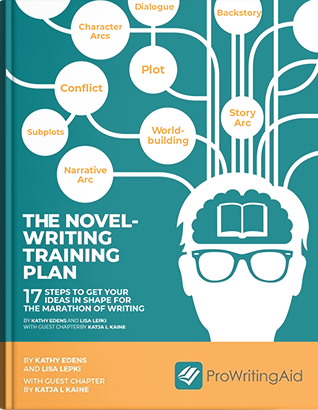
Imagine: you’ve just submitted your latest work to publishers or agents. You’ve been on pins and needles waiting for a response.
Finally, you get one.
It’s a quite polite canned rejection letter.
Your stomach sinks and you wonder: “They didn't even take the time to respond. Is my writing any good?”
For most writers, this situation might sound painfully familiar. The plague of self-doubt is all too real. Unfortunately, writing isn’t a craft for the faint-hearted. Whether it’s harsh criticism from a critiquer or a query rejection, we all take hard knocks as writers. And it’s easy for us to wind up with bruised egos and negative attitudes.
Even if this frustration tends to come with the territory, we can’t let it win. As NaNoWriMo HQ has proclaimed for years: “The world needs your story.”
So take a deep breath and ease up on yourself. Then follow these tips to get out of the writing doldrums.
1. You’re in Good Company
First, realize criticism isn’t a reflection on the value of your work. Almost all successful writers have faced rejections and harsh reviews. Take a look:
- James Patterson’s The Thomas Berryman Number was rejected 31 times
- Agatha Christie’s work was rejected for 5 years
- Madeleine L’Engle’s A Wrinkle in Time was rejected 26 times
- Stephen King’s Carrie was rejected 30 times
- Stephenie Meyer’s Twilight was rejected by 14 agents
- John Grisham’s A Time to Kill received 28 rejections
For even more examples of famous rejections and painful criticisms, check out this article on Lit Rejections and this list on Lit Hub.
Regardless of genre or eventual commercial success, even some of the greats faced an onslaught of rejections. You’re walking the same road, so keep your chin up and stay persistent.
As far as bad reviews, look no further than the Amazon and Goodreads reviews for any book on the market. No matter the number of 5 star reviews a book has, you’re bound to find at least a handful of 1 star reviews as well.
So try not to take the rejections and criticisms to heart. They happen to all of us. Instead, look towards the true fans of your work. Those members of your audience should be your north star.
2. Don’t Mind the Taste Gap
Sometimes, we end up feeling down about our work because we read others’ work and think: “They’re so much better than I am. I’m never going to be that good!”
Welcome to the taste gap.
In an interview, Ira Glass described the discrepancy between what art a beginner sees as good and what they actually create. Here’s the thing about the taste gap: it’s never absolutely closed.
No matter how long you write, there will always be other authors whose work impresses you. Your taste will evolve and change.
Don’t see these authors as competition or some standard you will never reach. See them as an example and inspiration for you to become even better.
And don’t forget, there’s also a retrospective taste gap to grapple with. Inevitably, you won’t just compare yourself to other writers, you’ll compare your previous work to your current work.
As long as you’re producing creative work, you’re going to learn and improve. This means that eventually, you’re going to look back at your own writing and go: “Ugh! I wrote this? I must be a terrible writer.”
This is simply an artifact of learning and growing. Even Terry Pratchett of Discworld fame revisited and rewrote one of his first novels, The Carpet People. The retrospective gap isn’t a judgement on your writing. It’s proof that you’ve improved and changed.
3. Work on a Different Project
Every now and again, your writing self-doubt isn’t about your writing in general, it’s about the project you’re working on.
If you’ve been editing your work, consider how long you’ve been in editing mode. Taking a critical eye towards any work for an extended period is bound to knock your attitude down a notch or two. And if you’ve been fighting a first draft for ages, you likely feel stagnant and frustrated.
The solution here is distance. You need to take time away from the project.
But instead of stepping away from writing completely, consider working on a different project. Preferably, the project would be something that you’re not worried about publishing and/or a first draft allowing for maximum creative freedom.
The point of this new project is finding the joy of writing again. You want to have fun with this and be as self-indulgent as needed to boost your mood. Eventually, you'll feel better about your work and you can return to your original project with fresh eyes.

4. Talk to Your Biggest Supporters
We all need cheerleaders for our writing. Just ask J.R.R. Tolkien.
In Your Best Year Ever, Michael Hyatt describes Tolkien’s experience working on the first book of The Lord of the Rings after his publisher requested a sequel to The Hobbit. Apparently, Tolkien bounced between the depths of despair and the height of confidence for the entire process. As Hyatt puts it, quoting from Tolkien's own remarks, “his ‘labour of delight’ had been ‘transformed into a nightmare.’”
It’s easy to see why his confidence might have been shaken. One of Tolkien’s fellow Inklings, Hugh Dyson, reportedly cried: “Not another [expletive] elf!” when Tolkien began reading an excerpt from The Lord of the Rings.
Tolkien gave up on writing the draft of the first book multiple times.
But one thing kept him going: C.S. Lewis’ support. This friendship made the difference in the very existence of a beloved series.
So talk to your supporters. Talk to your critique partners who love your work. Talk to your friends and family who are always there to cheer you on.
Yes, sometimes the advice may feel like little more than cheerleading. But even the cheerleading is necessary when you’re in a negative rut. Plus, these fans are the people you’re really writing for, not your critics.
If you’re looking for positivity with a bit more substance, toss around ideas with your biggest fans. Sometimes the smallest discussions can turn into ideas for bigger projects. And all it takes is one push to get your creativity flowing again.
5. Reconnect with Your Community
Writing gets lonely. It’s easy to feel lost or like you’re the only one, especially when rejections and criticism come into play.
But writing communities can always remind you that you’re never really alone. These communities give you a place to lean on and commiserate with other writers. If you’re shy, even simply reading about the experiences of other writers in these communities can help. And you’d be surprised what you can learn about writing as a craft and the publishing industry.
So take some time to find and connect with a writing community. With the explosive growth of online and virtual writers groups, it’s easier than ever to find your place.
Medium and Facebook groups are regular hangouts for writers, but don’t discount the power of writing-dedicated websites like Scribophile or Inked Voices. And in recent months, genre-dedicated writing organizations like SCBWI (The Society of Children’s Book Writers and Illustrators) have taken more and more of their events online.
Don’t be afraid to take communities like this for a test drive. And at first, it’s perfectly fine to flit around between several groups. But, once you feel like you’ve found your place, stick to only two or three groups. More than that will spread your time and attention too thin. It’s much better to immerse yourself in a few groups and make close friends rather than splash in the shallows of a large number of groups.
6. Take a (Planned) Break
If all else fails, you may be out of juice creatively. It may be time to consider giving yourself some time away from writing in general. After all, we all have to have periods of work and rest.
But consider this only as a final option. This tactic can be a double-edged sword as it makes it very easy to walk away from your writing and not come back.
So, this break has to be very carefully planned. Decide exactly how long you’ll be away from your work. Then, commit yourself to checking in on your writing at two- to four-week intervals, depending on how long your break will be.
The check-ins shouldn’t be involved, merely brief reviews of your current writing projects to test how you’re feeling about writing. If you’re ready to start on your projects, fantastic! If not, return to your break until you’ve reached your planned ending.
In the meantime, use your break time to spark your inspiration. The goal of this break is to fill up your creative tank. So focus on creative activities you enjoy that aren’t writing. Crafting, painting, playing a musical instrument and cooking and baking are all fair game.
You can use this break as an opportunity to dive into your To Be Read list too. Read good books (which can be inspirations) and read not-so-good books (which may boost your confidence). Reread books you love. Anything can serve as a spark to get your gears going again.
Reading articles on your favorite authors or their biographies and memoirs can also be a huge boost. Too often, we only see authors after they’ve had years of success. We see the final polished products on the shelves rather than the years of struggle behind a manuscript. Even overnight “breakout” debut authors often have several rejections under their belt. Most likely, the more you read about an author, the more you’ll find they’re not so different than you.
Enjoy this creative recovery to its fullest. But remember, the break shouldn’t last forever. When your scheduled “writing return” date rolls around, plan to write again, even if it’s only for a few days to a week.
In time, you’ll feel recharged and ready to tackle your writing again.
Always remember that writing is a marathon, not a sprint. And it’s always a bit of an emotional roller coaster. So don’t despair during the down times. Give yourself a chance to rest, recover and start again.
But don’t give up.
Remember: “The world needs your story.”


